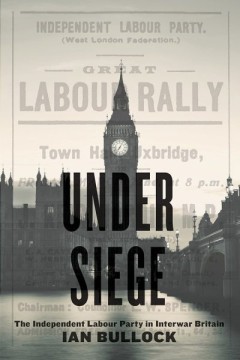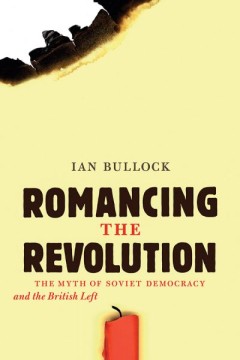Filter by

Under Siege The Independent Labour Party in Interwar Britain
Despite this reversal of fortunes, during the 1930s—years that witnessed the ascendancy of both Stalin and Hitler—the ILP demonstrated an unswerving commitment to democratic socialist thinking. Drawing extensively on the ILP’s Labour Leader and other contemporary left-wing newspapers, as well as on ILP publications and internal party documents, Bullock examines the debates and ideological…
- Edition
- -
- ISBN/ISSN
- 9781771991551.01
- Collation
- -
- Series Title
- -
- Call Number
- 6 x 9, 430 pages

Romancing the Revolution The Myth of Soviet Democracy and the British Left
Over two decades have passed since the collapse of the USSR, yet the words “Soviet Union” still carry significant weight in the collective memory of millions. But how often do we consider the true meaning of the term “Soviet”? Drawing extensively on left-wing press archives, Romancing the Revolution traces the reactions of the British Left to the idealized concept of Soviet democracy. F…
- Edition
- -
- ISBN/ISSN
- 9781926836126.01
- Collation
- -
- Series Title
- -
- Call Number
- 438 pages

Under Siege The Independent Labour Party in Interwar Britain
Despite this reversal of fortunes, during the 1930s—years that witnessed the ascendancy of both Stalin and Hitler—the ILP demonstrated an unswerving commitment to democratic socialist thinking. Drawing extensively on the ILP’s Labour Leader and other contemporary left-wing newspapers, as well as on ILP publications and internal party documents, Bullock examines the debates and ideological…
- Edition
- -
- ISBN/ISSN
- 9781771991551.01
- Collation
- -
- Series Title
- -
- Call Number
- 6 x 9, 430 pages

Romancing the Revolution The Myth of Soviet Democracy and the British Left
Romancing the Revolution uncovers the imprint of this myth on left-wing organizations and their publications, ranging from those that presented themselves as “British Bolsheviks”—the British Socialist party and The Call, the Socialist Labour party’s The Socialist, Sylvia Pankhurst’s Workers’ Dreadnought—to the much more equivocal Labour Leader and The New Statesmen.
- Edition
- -
- ISBN/ISSN
- 978-1-926836-13-3
- Collation
- -
- Series Title
- -
- Call Number
- 438 pages

Under Siege The Independent Labour Party in Interwar Britain
Despite this reversal of fortunes, during the 1930s—years that witnessed the ascendancy of both Stalin and Hitler—the ILP demonstrated an unswerving commitment to democratic socialist thinking. Drawing extensively on the ILP’s Labour Leader and other contemporary left-wing newspapers, as well as on ILP publications and internal party documents, Bullock examines the debates and ideological…
- Edition
- -
- ISBN/ISSN
- 9781771991551.01
- Collation
- -
- Series Title
- -
- Call Number
- -

Romancing the Revolution The Myth of Soviet Democracy and the British Left
Romancing the Revolution uncovers the imprint of this myth on left-wing organizations and their publications, ranging from those that presented themselves as “British Bolsheviks”—the British Socialist party and The Call, the Socialist Labour party’s The Socialist, Sylvia Pankhurst’s Workers’ Dreadnought—to the much more equivocal Labour Leader and The New Statesmen.
- Edition
- -
- ISBN/ISSN
- 9781926836133
- Collation
- -
- Series Title
- -
- Call Number
- 438 pages

Romancing the Revolution The Myth of Soviet Democracy and the British Left
Romancing the Revolution uncovers the imprint of this myth on left-wing organizations and their publications, ranging from those that presented themselves as “British Bolsheviks”—the British Socialist party and The Call, the Socialist Labour party’s The Socialist, Sylvia Pankhurst’s Workers’ Dreadnought—to the much more equivocal Labour Leader and The New Statesmen.
- Edition
- -
- ISBN/ISSN
- 978-1-926836-13-3
- Collation
- -
- Series Title
- -
- Call Number
- -
 Computer Science, Information & General Works
Computer Science, Information & General Works  Philosophy & Psychology
Philosophy & Psychology  Religion
Religion  Social Sciences
Social Sciences  Language
Language  Pure Science
Pure Science  Applied Sciences
Applied Sciences  Art & Recreation
Art & Recreation  Literature
Literature  History & Geography
History & Geography